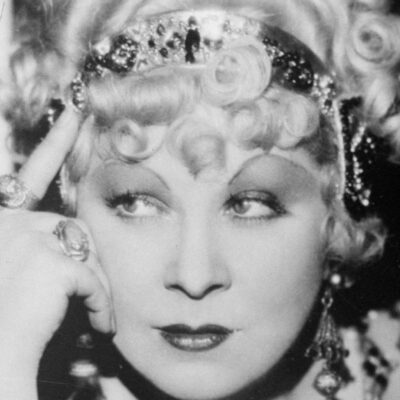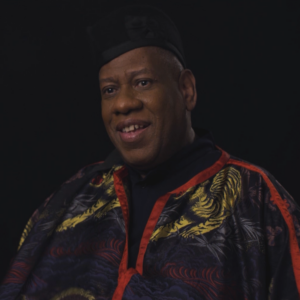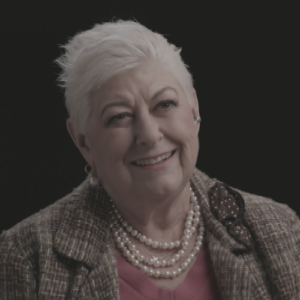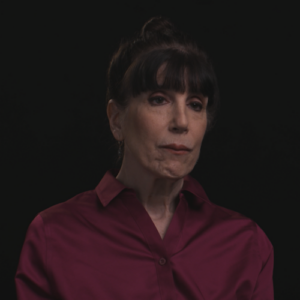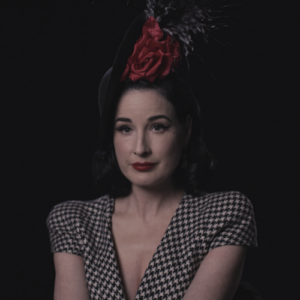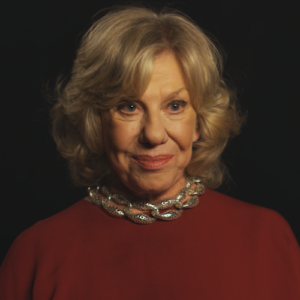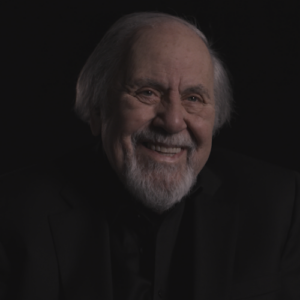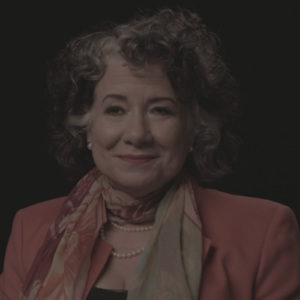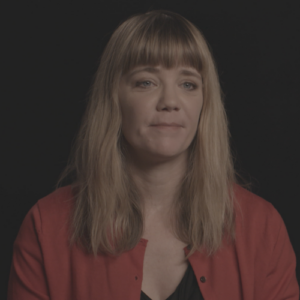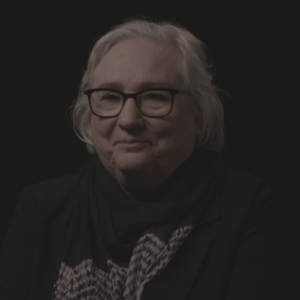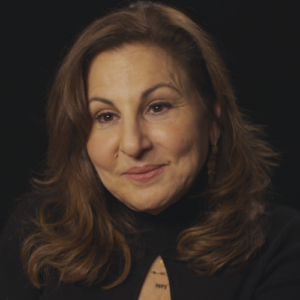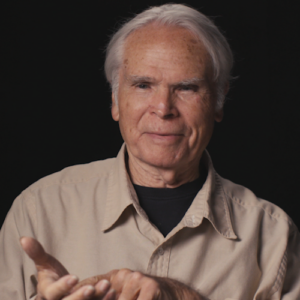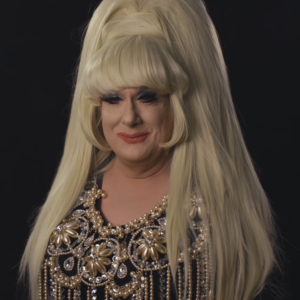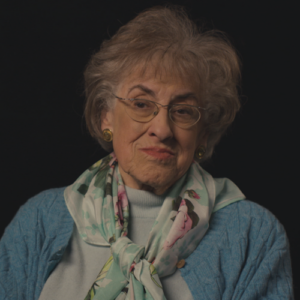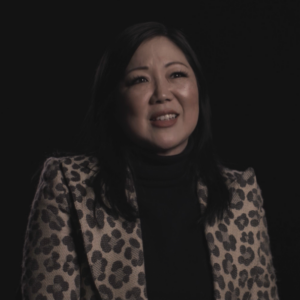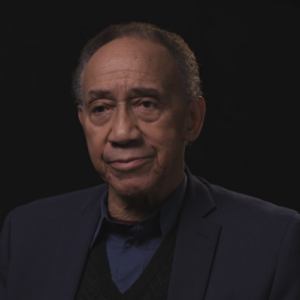Interviewer: You know, the other big comedians at the time. You talked about this a little bit, that article that we looked at, Just compare, I guess, first to the physical comedians to what she was doing, that they weren’t that sort of physical minimalism, like Charlie Chaplin, Buster Keaton.
Margo Jefferson: Well, she was a woman, so she was not going to get, you know, those kinds of elaborately physical clown like, you know, really with the skills of a circus virtuoso roles. But what she must have learned in vaudeville and in shaping plays around herself was how to use her body to its best advantage and how to use it, which all of those great comics, the silent ones, understood how to use it to control emotion, rhythm, you know, everything. Now, I bet she was watching some of, you know, someone like, in fact, I’m sure she was watching someone like Clara Bow now, who is very funny and charming. And also, you know, some of those silent women actors, especially the comic ones, were very canny about using their bodies, but hers was different. You know, Colette called her like a blond butcher. And so she had to be very both virile and very sensuous, you know, kind of languid, undulating. And that a fascinating combination. She looked at men, too. She certainly watched that drag performer, Burt Savoy. You know, so she learned also how to make all the familiar seductive gestures, the gestures of seductive manipulation. She learned how to make them theatrical, you know, not natural, not seemingly natural, but absolutely theatrical and performative. She also clearly knew the urban blues singers, the women. She knew their work very well. So she was watching that again, though, swaggers on to the stage. And this very canny use of tough woman, tough, independent woman like, you know, there is a kind of prefiguring of the songs Mae West sings in the persona in an Ida Cox song called All Women Don’t Have the Blues. I’ve got a disposition and a way of my own. When a man starts kicking, I let him find another home. I get full of good liquor, walk the streets all night, go home and put my man out if he don’t act right. Because while women don’t worry why women don’t have no booze, there’s even a line that goes. You never get nothing by being an angel child That’s in the twenties. Flash forward to I’m no angel. Also, I’ve got a disposition in a way of my own. I’ve got a system all my own. So, you know, she she was master at picking up everything she needed from every, every piece of really accomplished show business and music craft.
Interviewer: That’s fascinating. The what what those female blues singers are singing about the sort of, you know, about sexual freedom. And they’re not singing about husband and family.
Margo Jefferson: Very seldom. No, never. Virtually never. Family. My man. Yes, but usually husbands. No. You know, the blues has so many modes and moods. But if we’re talking about the jaunty, assertive, defiant one, yeah, they’re singing about hitting the road. They’re talking about they’re singing about partying. They’re singing about leaving a man maybe because he’s no good, Maybe because he treats you badly, but maybe because he’s a boy.
Interviewer: So how common was it at the time for white women to sing those?
Margo Jefferson: Well, it wasn’t she wasn’t the total pioneer in that. White women had started in vaudeville with someone like Mae Irwin, for example, or Sophie Tucker, who was a little earlier to sing what we call ragtime songs that then morphed into the urban blues, which kind of combined the blues one with with her ragtime. So she wasn’t ahead of the pack in that way, but. You know, she she hit the ground running and since she had a career, found her way to Hollywood to carve out a career there, you know, others had recorded and others had sung on stage. But she was putting these songs on film and, you know, she was picking songs by black rag and blues popular composers Shelton Brooks, W.C. Handy. She sang Frankie and Johnny. That song is so old. You know, in black culture, no one knows. Who knows? You ready for Battle of the nineties? She insisted that Paramount hire Duke Ellington because she wanted to sing this torch song, which she does very well. FLYNN She was good singer. She really was. She knew how to put over a song and she does funny diction things that just tickle me because, yeah, there she is. She’s from Brooklyn, right? And yet and she’s got this accent. It’s part Brooklyn and part black and she’s got her song goes, I know a guy what takes his time and the tickles me because the the delivery is basically black the diction a guy what takes his time is Brooklyn easy Oh it’s a she’s she’s funny that way.
Interviewer: And he’s like oh so you know she she goes up to Harlem, she goes to nightclubs. I get the impression she’s nice.
Margo Jefferson: And she’s doing this all the time when she’s on the vaudeville circuit, too. You know, every city she’s studying the dance moves, you know, as well as going to the to the black clubs and going to the largely white theaters.
Interviewer: So when she goes, she’s not going in ermine and pearls. I mean, she’s not going at this at the same intent.
Margo Jefferson: What do you mean the same intent is what.
Interviewer: You know, the sort of the slumming.
Margo Jefferson: It seems not it seems that she was going, you know, not as a society dame. It seems that she was going. And again, this was not so uncommon as a performer to watch other performers. Now, it’s hard to imagine that May wouldn’t also swagger into any any nightclub. But she was she was there to watch and learn and appropriate. She was not there to just party. Well, I’m sure she party to, but, you know, not there. They just show off how cool she was, I don’t think. Yeah, she was a she was there as a professional and I’m sure she had some very good times there, too. I’m sure she. Yes. Was also there as a as a good time girl.
Interviewer: But then she does a show like Constance Center, you know, based on that book of hers. And she has this, you know, this thing, the speech that she gives at the end of every performance where she sort of distances herself from that character, she’s have to go up there. I don’t do that.
Margo Jefferson: Well, she had her own problems with the law and with censors and also with whatever she had internalized. How could she not about what the lines of race mixing, if you will, and race crossing, what they were, what they would allow her to do? I mean I think I’m not yeah I forget for that that so I’m not I’m not surprised by that she was not generous in those ways but she was watching out for her career and for her persona, which I know white women had to watch out for very carefully.
Interviewer: So she credits Bert Williams in the autobiography. What is she what does she take from him? Well, let’s just say.
Margo Jefferson: Bert Williams was a great vaudeville star. He had a partner named George Walker, and the two of them would work together. Walker was wonderful dancer, apparently, you know, kind of dashing dandy. And Bert Williams’s persona was this melancholy, clownish, but moving and in his own way, shrewd figure, almost like a Shakespeare fool kind of figure. What I think she learned from him actually was in part, I mean, she she turned it into this ebullient caricature, but he could move very, very slowly with great rhythmic languor, yet precision. And I think that I think that that was extremely useful to her. Also. He had a wonderful way of. Speaking and singing, doing both. And she became extremely good at that, too. And not only when she sang, but her speaking voice is really a kind of a you know, it’s approaching speech song. And Williams was fabulous at that. I’ve heard recordings.
Interviewer: But I mean, he’s also he’s this sort of tragic figure, and that’s a big part of his comedy.
Margo Jefferson: Well, I would say melancholy as his audiences saw it. It turned into it devolved into tragedy in his personal life because he was facing segregation all the time. He was never allowed to perform out of blackface. He was a very intelligent man who I’m sure would have liked to play other kinds of theatrical parts. It’s not just the blackface. It was never moving out of this kind of dialect type, social type. He worked with it as much as he possibly could. And he he was a genius. Louis Armstrong adored him also. So, you know, was nothing to be ashamed about with him. But the the racial and racist constraints imposed on what he was allowed to do as a performer were tragic. As a as a performer, what he did with them was triumphant. May was nothing approaching tragedy, you know, in any way. It was always the comedy. And in this way she is very different from Chaplin or Keaton. More like the Marx Brothers in that way was always about winning and triumphing and overthrowing codes, you know, tossing them out, getting the better of them, besting them. I think in many ways the stakes were higher for her because this was as she knew very well, this was sex comedy, you know, So a woman like this always being an outlaw, you know, always outsmarting both the legal system and, you know, the criminals. You know, that’s that’s that’s much more radical than with the Marx Brothers to do in that to really overturning whole constructions or at least thumbing your nose at whole constructions of femininity, of white femininity.
Interviewer: Oh, so old white femininity.
Margo Jefferson: But and to some end what became black bourgeois femininity, certainly. I mean and that’s the blues women, black, white, blues women were doing that too. But constructions of black womanhood were not at the center of the culture the way constructions of white womanhood were.
Interviewer: But if the stereotype of of women of color at the time was that they had a bigger sexual appetite, was that nice?
Margo Jefferson: Was that part of what she took in? Actually, yeah. That’s that’s that’s a good point. What what the blues women were able to do was make that a kind of triumph, either, you know, triumph of, you know, ebullient, almost comic live or a triumph of of a forceful individual self. Even if you were Bessie Smith singing in a washer women’s blues or, you know, Lonesome Woman blues, But still the the creation of this three dimensional theatrical and musical self. So again, Mae West had this gift for turning drama into successful satire and and very cunningly controlled caricature. So I would say she could have caricatured those women. She was smart enough not to. So what she did was appropriate. The the savvy, the independence, the the the canny cheekiness, you know, of those personas. The Ida Cox song, again, is a perfect example. And I don’t turn that blond so she devil loose on on a world of largely of entirely white men.
Interviewer: It’s great. How does she get away with it? How does she get away with that kind of cultural commentary to the degree that she does.
Margo Jefferson: Being a great entertainer, the laugh lines, you know, you can’t not I suppose you could. They her audiences really couldn’t not laugh. She was she was a terrific comedian. And she also she used these old plots, you know, in her plays, which would then become the movies and she’d write the script. So she also knew how to tailor everything for herself. But she would take melodrama, join it too far, as you know, throw in some elements like, oh, here’s a lion taming scene. She was a good time gal, you know, and she invited everyone to have a good time. I think the first time I ever saw an Mae West movie was with my mother. And I remember saying, you know, you’d watch movies with your mother, old movies on TV. And I remember her saying women liked Mae West. You know, she was letting us in on the joke and letting us have a good time. Well, I never liked her because also, you know, she was the girl who crossed the tracks to play with the boys and promised them a lot of pleasure. What’s not to enjoy here?
Interviewer: Well, was do you think that she was she was she trying more to get the men on her side? The women on her side? Was it really was her comedy geared toward both?
Margo Jefferson: You know, I forget. So you’ll have to cut this out of the I forget what she says in her book, but I know she talks about a newsstand. If she does say that the melodrama and the costumes were very helpful in appealing to her women audiences. And I think she does talk about figuring out, you know, what different constituencies male and female would need. But I don’t think you ever feel that she’s even though the couple of women get accidentally killed in her movies. But they’re always voices of of evil. She’s all usually or virtually always helping some genuinely sweet ingenue who has good intentions. So, you know, Mae becomes the kind of sponsor, you know, of her. You see, I’ll I’ll help you stay poor because you want to open an orphanage or are you been in white slavery? Do something like that. So she’s very smart that way. But, you know, she gives the guys the if the villains get overthrown, the the clunkers, you know, the dweebs, the fools get thrown aside, you know, and men in the audience can identify with all those guys. She decides to like kind of bump and grind two records and go off with at the end of it.
Interviewer: And the villains are always, it seem, have a class.
Margo Jefferson: Not always they were over and she done them wrong. There’s that no and I’m no angel I guess there’s slick the you know the working class guy who’s been trying to bribe her or blackmail her because of some not quite defined scheme. So no, there are some some like lowlife types. It is if they kind of wandered into to a farce from, you know, a paramount gangster movie of it, suddenly there they are, like, maybe they were a boyfriend of hers for a while, but that’s not too clear. And then they try to double dare and she gets them straight and she’s being courted at the same time. Some upper class guy. She usually does win him over in the face of some distasteful, distasteful, snobbish upper class guy. But know she kind of divides the villains. It’s like there’s a really cool upper class guy. Then there’s a villainous, snobbish one, and then, you know, the same thing. You know, there’s a decent working class guy mean she’s usually not having sex with and there’s one she may have been whose not turns out not to be decent. So she’s got these formulas that have been comic and drama formulas for centuries, you know, and they’re moving into movies and she’s giving you costume drama. But it’s it’s comedy. And so she also knows how to bring the new a touch of what’s fresh and new, you know, to formulas that comfort And please.
Interviewer: You know, it’s interesting. We always think of the maids as being the women that she connects with most of these movies. But you’re right, there are there are these sort of fallen ingenues.
Margo Jefferson: Those are the ones she connects with in a sense. More. There’s there’s usually a one line exchange, you know, with a with a maid where they they clearly, you know, understand each other. And yeah, they are they’re both amused by the situation. It’s a nice, you know, servant master mistress relationship. But I actually. I Maybe she connects more. She connects more with the older news because any white ownership in a movie of that time is going to be more connectable to in the audience. So of course she has to do that. The women are dissects the black women in her movies. Unlike the black women she was listening to in nightclubs in the theater, the black women in her movies are uniformed, desexed, benign, somewhat worshipful sermons.
Interviewer: And where do we even start with the maids?
Margo Jefferson: Let’s see. And Gertrude. Howard. Libby. Somebody. Libby, Clark, maybe. And the an uncredited Hattie McDaniel. They they frame her. So they set off this blackness, you know, this explosion of blindness. They set off the glamor and the sexuality little. There’s everything from their skin to the black uniforms at the white aprons. And they at the same time, they they endorse because they’re usually framing her when she’s singing something. So they are endorsing this kind of, you know, subversion of propriety that her song is giving off or that her one liner is going to set in motion.
Interviewer: So what do you think of that scene where she’s singing?
Margo Jefferson: Think I found a new way to go. I found a new way to go to town. Yes, you did. You know, that scene always tears at me the way so much in American culture does. I notice on YouTube you can hear it. You can hear a recording of it that I haven’t been able to find it. The scene being played, I’ve seen it, you know, in teaching DVDs of the movies. It’s it’s hard. She sounds terrific. She’s playing it for all it’s worth. You know, she’s in a kind of state of ecstatic revelry, Right. I’m taking over the town. And yet surrounding her are these uniformed maids who are basically fawning on her. Oh, yeah. All you talent in that. And that voice, those voices that are, you know, Hollywood’s version of black vernacular, which is not really your vernacular. It’s a created, constructed dialect. It’s meant to sound a little naive and a little ignorant. If, for example, you listen to Hattie McDaniel, who’s the one who became famous, I mean, she did become a kind of star, but she was a blues and pop singer, recorded a little bit, was mostly on the road and in vaudeville and successful in the twenties. You listen to her singing. She, you know, has a kind of bluesy diction, but she’s not talking like that. You know, like she talks in any of her movies or we go through that whole miss, Oh, you know, Miss Tyra now. So she wasn’t improving the situation in that way. She was looking out for herself. So it was, you know, her appropriation of various styles, modes, traditions of black culture, performance culture. Appropriation is can be exploration and which it was because she used much of this in interesting ways as a performer in fresh ways. And it can be exploitation which it also was because you know the they got closed out of it, out of the history of it, out of the acknowledgment of it, except as minions.
Interviewer: She did become a star, but that even though she did this, then that’s what led up to your explanation that in fact, this.
Margo Jefferson: Was so these these women, one of whom is an uncredited Hattie McDaniel, are in in this movie. They are framing. You better check on whether McDaniel is framing her in this in this scene. But she is being framed by black women in this scene and they are basically all playing and paying as she sings bluesy ragtime song obeisance to her. They are utterly sexualized. They have no particular performative skill as directed. Nothing could be more different than what may actually learn in this song she’s singing from. These seasoned, canny black women singers that she studied. It’s particularly interesting, wrenching, angering that Hattie McDaniel’s in that film. She is of she’s the black woman who did become a star. But the way she spoke in most of her movies and the way she and Gertrude Howard speak in this movie, it’s that Hollywood, you know, infantilizing construction of black vernacular, which is this kind of crude dialect. It’s, oh, you know, kind of up there in Waverly and makes you seem very naive all this time and worshipful when you hear Hattie McDaniel sing. And she was touring and recording in the twenties. And she was she was a nice blues and pop singer and sound like that at all. Yeah. So what was Mae West doing in that scene as demonstrated? You know, usually you don’t see her literally framed by black performers. But, you know, you look at this whole picture of her relationship to black music, black performance style. She was appropriating appropriation is both exploration. If you use honor those traditions by how you use them, which she did.
Interviewer: So we’re going to go with that. Well, I guess you see in that scene.
Margo Jefferson: Okay, What do we see in this scene? If you just want to have a good time, which, alas, is not entirely possible, but you see may sprawled, you know, on a divan, singing with total reverence, panache, you know, about her triumphs. You’re just going to marry. She’s conquered Cary Grant, and she’s conquered the entire town. She’s a star in public and private life. And the song is terrific. That it really is. It’s know blues, ragtime. Mhm. It’s. It’s like a star, a number. What you also see, which is not fun, is for black maids framing her, moving in and out of the scene, all offering this kind of Hollywood constructed, naive, too ignorant dialect worship of her own, this towering use of this and that. And she, you know, throws herself out the divine like some colonial ruler. Really, the stance is very much about what, you know, oh, white king in a black ghetto country or colony could could assume. And you know, she’s joking back and forth them. It’s Conrad Black, but it’s she has conquered their culture, too. And they are only there basically to pay homage to her, given the history that we know of, you know, what she learned from and took from and studied, studied in black performance culture, black blues and pop singer performance culture, it really becomes excruciating to look at that scene. So she appropriated, you know, very skillfully many elements of black performance, particularly female, though some male and appropriation can be exploration. She did it very well. It is also exploitation. And that scene is a very visible example of it. Part of me is almost grateful that it exists because it is so visible, so naked. You know, it’s like court evidence. Oh, but. Whoa. Yeah.
Interviewer: Is it fair to say that’s pretty typical of the portrayal of these maids in the movies at the time?
Margo Jefferson: Oh, God, yes. Virtually. Yes. No, that’s what they were originally all like. Yeah. To one degree or another, you know, this one’s a little more meek and timorous. That one’s a little more aggressive at one’s very sweet and benign and, you know, almost like, you know, the, the ame, the angelic self servant self of, you know, maybe a kind of bad woman. So she’s got that kind of range, but that’s not a lot of range. Her diction, the amount of space she’s given to be a personality. Minimal. Hattie McDaniel really did make the most of that. She had a forceful personality and also very good comic timing. When you listen to her recordings, they’re not that many of them. Her blues and pop recordings from the late twenties, mostly she was a successful, not a superstar, but a successful singer. She was good. Now she’s has this. She’s using black vernacular. You know, it’s canny, it’s slangy. It’s it’s saucy and savvy. And you think, oh, so suddenly this secret self that was became a secret self because Hollywood had absolutely no place for it emerges.
Interviewer: Is it? What aspects of black performance do you see? In May you referred to some of these sort of minstrel gestures.
Margo Jefferson: Well, she’s the way she rolled her eyes, which is to me hilarious. I like I mean, she’s I think it’s very funny. She’s very good at it. So there is that. It’s not only black, but there’s a way of swaying with her hands on her hips. I mean, I mean, hands on your hips are hardly only black with this particular kind of sway swagger. That’s as much a kind of setting of a rhythmic pace as it is a dramatic gesture. She does that as well. It’s all over her singing, you know, which is why she has shown up on a couple of, I think, issued in the Seventies Blues Women Singers anthology. And that’s not wrong in terms of her delivery, you know, and the songs she picked. Wow. Yeah. Also, her voice, we I think we already talked about Bert Williams. Right. But the the voice, the timbre, but also the diction. It is part Brooklyn, but it is also part urban black. And and that mixture gives her just the disguise she needs.
Interviewer: I heard that again cause I interrupted you.
Margo Jefferson: Okay. Her diction, too. First of all, you know, she’s got that languid rhythm, that one associate first with Southern blacks, but then with a rhythmically black performance style. She’s got diction that is partly black, but also partly Brooklyn. So there’s a kind of nice disguise thing going on there, too, right? I’m not wholly black. Right.
Interviewer: It’s so funny. You mentioned the hands and the hips. It was literally two days ago Julie and I were talking about like, what does that mean stance? She has it all the time.
Margo Jefferson: Yeah, well, it’s it’s tough. It’s tough, man. To when women have that stance, you know, they are taking center stage, both literally in the theater and in the culture as fighters, as as warriors. You know, it’s a challenge stance or it’s a I’ve already one challenging stance. Yeah. For her it also as with women blues singers who did it when combined with an undulating walk it’s also an invitation and and you know a forthright and again this is about my conquests. This is not about little timorous seduction of you. This is about I’m your equal in terms of sexual desire and power.
Interviewer: So mostly what you think that walk is about is that which, is that what shape that walk? I mean, it’s such a deliberate.
Margo Jefferson: Well, you know, the walk comes from the the plays that she’s writing and which then are turning into the movie scripts that she is, in fact, writing. So the walk is part of the persona and she is writing her own lines. So do you I mean, I’m sure there are other explanations, too, but they’re all going to fit into the persona she’s creating, literally writing as well as performing.
Interviewer: This may be a bit of a stretch. First thing, do you think that this kind of black performative style that she’s taken in has anything to do with her being censored?
Margo Jefferson: Well. You know, it was. We don’t know what she was like on the stage. And her first experience, experiments with censorship really came with sex right in the twenties. The twenties play for which she went to jail. It seems as if, you know, very early on she was incorporating black as well as drag white and black material, because she also wrote that play called The Drag, which included, you know, Harlem Harlem drag bar scene. Early on, she was incorporating this material. So you’ve got this little pastiche of things that are threatening. You’ve got, you know, all the sex jokes. You’ve got the brazen, delightfully brazen performances in songs, including, you know, the non-black songs she sings. And on top of that, you’ve got all these illusions of taking in of race. You’ve got race mixing, you know, in terms of her plots and in terms of her persona. So, you know, is there written evidence? I mean, I don’t know that the production codes every said, Well, and, you know, look at this, you know, nasty. And they would have used a very ugly word style. But I’m sure that contributed. Sure. It all it contributed to her seeming like an absolute rebel against, again, what we must call the propriety of white femininity. You know, Shirley Temple became a big star. Not at all long after Mae West. Now, that’s kind of interesting. I mean, you know, because she’s she is the vivacious child, but she’s a child, you know, and she’s she actually even has some sex appeal. But it’s just interesting that the culture would crave little Shirley Temple so soon after or really almost around the same time as Mae West, that there is Shirley who can also tap dance and has that currently hearing her. You know w knocked up D.W. Griffith apparently said that he wanted he thought the idea of pairing Shirley Temple with Bill Bojangles Robinson was terrific because the culture could not resist in this safe way. Seeing a black man and a little white girl slash woman together. If you think of Mae West incorporating black and white masculinity and black and white femininity into her persona, the culture clearly couldn’t resist it. Barb was threatened. Of course, certain certain aspects, certain power, groupings of the culture. Yeah.
Interviewer: You know, we actually have footage of Shirley Temple doing and Mae West in person. Oh, my.
Margo Jefferson: God. Oh, my God. Is it pretty good?
Interviewer: It’s obscenity was pretty great.
Margo Jefferson: Please. She was a very talented little, little critter. Yeah.
Interviewer: You know, so she. I think it’s the late thirties. She really overtakes me. I mean.
Margo Jefferson: In terms of like, becoming the hottest, the the most high earning for the studio.
Interviewer: I think that has anything to do with what’s happening in the late thirties at the time. I mean, depression is dragging on. Is that reflective at all of where the country is going?
Margo Jefferson: Well, but, you know, I, I, I don’t know. That’s too big, too big for me to jump into right now. But let’s you know, what are some of the elements? I mean, why did you ask the question? The thirties has also seen, you know, gangster films and romantic comedy. Now, you know, some of the romantic comedy women do. They very much more bourgeois about it, but they always something to Mae West. In fact, you remember that scene in it happened one night where Claudette and Clark are on the road. I got this from a friend’s wonderful book on romantic comedy, and she says, Oh, I can get a car for only hitchhiking. She says, I’ve got a system all my own and hikes.
Interviewer: So it happened one night.
Margo Jefferson: So, yes. So these young, you know, as Mae West learned from her predecessors, she’s so different in manners. So I but think of these cheeky verbal, you know, young women in the city making their way. Claudette Colbert plays direct homage when she hooks up her skirt on the road with Clark Gable. And it happened one night and says, I’ve got a system all my own. Yeah, paying, paying tribute, too. So you’ve got you know, Mamie is also is taking in little gangster moves Maybe that’s also what these. Maybe somebody should compare some of James Cagney’s movies with Mae West. So she’s playing with gangsters. She’s playing with the old Hollywood formulas. But she is creating though, their period pieces. They are a certain version of screwball romantic comedy now. But, you know, she’s surely represented more full out optimism and vulnerability. You’re a child, so the plots always involved risk and, you know, social disruption and, you know, someone being the menace of societal forces and, you know, romantic comedies also put those heroines on at innovate, gave them more risks. They had to overcome more. May was also not romantic comedies in in some kind of union usually marriage that was not what you know what Mae West movies were doing. So she was, as we always quote that Arthur Miller line in certain ways. Culturally, she was losing her territory.
Interviewer: Well, that’s one thing that she’s really from the very beginning, Her her entire career is vulnerability.
Margo Jefferson: That’s true. Now, all comedians don’t need it. You know, Chaplin had it, Keaton had it. W.C. Fields didn’t really Harpo had it. Groucho didn’t. But no, she was I’d say she was a satirist. Not not there was not pathos in in her comedy. And maybe, you know, as those rough depression years came came along, a certain pathos, vulnerability was more needed in even the most delicious and delightful heroines. Barbara Stanwyck can give you vulnerability for all her power. Hepburn loves to turn it on, you know, suddenly with her vocal quivers embedded in down. So, yeah.
Interviewer: Well, I wonder how depression audiences as total speculation but how they react to it. This is part of her appeal. She’s this woman who she hasn’t lost her Brooklyn roots, but she’s dripping in jewels.
Margo Jefferson: Maybe the period, the costumes of those opulent period, you know, as the thirties went on, she did, you know, Klondike Annie, you know, she she did maybe toned the opulence down a bit. But the plots remain very old, didn’t they? You know, nothing but gangster films and romantic and screwball comedies and, you know, the melodramas that were still around, they were being set in the here and now. No, they were taking from the news the daily life of people.
Interviewer: You know, called Akani. She speaks Chinese, that she speaks Chinese with her made out. This is actually I was going through and compiling all the magazines.
Margo Jefferson: And interesting and.
Interviewer: I noticed that.
Margo Jefferson: Interesting.
Interviewer: There’s one movie where she is a white maid and she has no camaraderie with her.
Margo Jefferson: And she is not interested in her enemies.
Interviewer: Yeah, she has a very different interaction with the black maids than the white.
Margo Jefferson: There’s a certain degree of there’s a with the Chinese. Me too. There’s a certain enjoyment with the black maid. I don’t know. The Chinese. Intense as if they’re all in on some kind of secret joke. Yeah. Very dirty, Definitely.
Interviewer: Yeah. It almost seems like they get her humor. She like.
Margo Jefferson: They get. They get it. Yes, they get her humor. They appreciate it. That’s right. That’s right. And she doesn’t have to Implicit is that in front of them? She doesn’t have to remotely pretend to any other motive than, you know, pleasure being herself triumphing and scheming.
Interviewer: That’s so true. I mean, to catch up on where I am. Pacific. Do you think that Mae was was she threatening because she actually was that character?
Margo Jefferson: She writes about herself as if she was that character? Yeah. Yeah. You know, I think also women performers are consistently traditionally they’re at their level of craft and calculation in terms of the persona, the performance. I’m a built skills and I’m using calculation as a compliment. That level is is consistently underestimated. You know, many of these Hollywood actresses were and stage performers that she were and singers were very, very smart and talented and very hard working performers who knew their craft and their art inside out. And she certainly did.
Interviewer: I think, toward the end of the movie career, does that does that persona become a bit of a tramp?
Margo Jefferson: Yeah, She’s getting, you know. Yeah, she it’s getting more. Colette wrote some of the best criticism or they made some of the most appreciative and shrewd observations about her. And she is noticing already, she says by I’m no Angel, but she’s still 33 that she’s getting. Mae West is getting a little more mechanical. The delivery. She also notices that she’s getting thinner, which she thinks is bad, meaning she’s conforming to this more self like style that’s was part of the twenties and is going to make its way back. And, you know, she she she can’t change. And so she does not know how to age. And you know, by the time you get to obviously the forties or dear God, my rebellion you know Breckenridge you know she’s like in a state of frightening paralysis. You know, she’s locked into the casket of, you know, the former self. She really does not know how to adapt. That’s the one thing as a performer she did not know how to do. What what stopped her? I’m not I don’t know. Something inside, perhaps, as well as maybe some, you know, genuinely feeling that there was no where to go. But that’s that’s the persona that had gotten her everything and maybe no help if she had other ideas, you know, who was receptive to them.
Interviewer: I do think she thought until her last day on Earth she looked amazing.
Margo Jefferson: That’s terrifying. It really is. I mean, you know, perhaps if we believe that everyone deserves every ego, deserves the most gratification they can possibly get, then maybe that’s a happy story. But it would be a much happier one if she had managed to age in a way that made her still look good on her last day of her last day on earth. At that age, women know how to do this better now than they used to. But what would that she had been able to bring the kind of shrewdness to the aging of the Mae West persona that she was able to bring to its creation and and perpetuation even.
Interviewer: Do you think that’s. Toward the end of the Hollywood period. She she’s starting to be visibly older. Is that part of what people are reacting to?
Margo Jefferson: Probably, yeah.
Interviewer: Talk about that.
Margo Jefferson: I can’t talk about it that much. I think it’s the destiny of any actress from the teens 20, 30, 40, 50 into the sixties. Anne Bancroft is what, Dustin Hoffman’s age when she’s playing Mrs. Robinson. This is ridiculous. So that, you know, the this the gradual decline of Mae West, which is starting late in the forties. Really? Okay. She is getting and looking older the plots the genres that she’s they’re not seeming fresh anymore. Know Hollywood and theater keep producing you know new variations possibly on old themes but you know. Oh we’re moving into film noir in 40 whereas whereas May we’re also doing after World War Two all those those endless domestic, you know, dramas and comedies, husband and wife stories. No, this is not for Mae West. And aging is a problem they are all struggling with. All these actresses are figuring out what? Everything from How do I make myself up to what property, what kind of movie? What kind of story with what kind of leading man do I need? Do I fight for that? Will you help me make an interesting transition? You know, that makes me look intriguing rather than aging. Yeah. We look at Barbara Stanwyck was very good at that. Look at Double Indemnity. Right? She’s a killer. She’s you know, she’s working with an actor who used she used to do romantic comedy with who’s now a weak villain. And she’s got that blond wig now and she’s merciless. So, you know, it’s it’s knowing those and being able to work with those variations. Mad Men was also, in a way, she did not profit by her uncanny individuality. What were you going to do with her? You know, were you going to create something entirely new who was quite imaginative enough, imaginative enough to see some way she might be used that was fresh. Now, is it true that some that did, some did either the produce did. MANKIEWICZ Did somebody suggest that she should do All About Eve?
Interviewer: Oh, I never.
Margo Jefferson: I thought that I read it. When did you hear.
Interviewer: She was offered Sunset Boulevard?
Margo Jefferson: That Sorry, that was it. I was thinking all about Eve isn’t making a lot of sense that that is interesting. Sunset Boulevard May could it could have possibly worked. I’m not sure she wouldn’t have found it humiliating.
Interviewer: Well, this thing I was thinking when you were talking that if she had done Sunset Boulevard, that’s not really a new incarnation of her. That’s sort of like the sad, inevitable conclusion.
Margo Jefferson: Unless she could have found a way to play it that was extreme and in some way comment. But she would have had to be Billy Wilder would have had to be her collaborator on that. And maybe that’s not what he wanted. You know, Gloria Swanson is mesmerizing, but it’s because she is grotesque. Mae West did have the right not to not to want that. Yeah. Also, it would have had to be funnier in some ways. I mean, at least in those moments, she would have been have had to make more comic.
Interviewer: Yeah. I think she would have just insisted on rewriting her time. Well, you know, one thing we haven’t talked about that much yet is the the sort of gender play of of this construct, the the idea of playing at femininity which.
Margo Jefferson: Yeah, we talked a little about it, but not, not much. Again, one in one important element of the of the vaudeville and stage days was yeah, drag was flourishing there. One of the big stars who always insisted made great points of saying, you know, I’m not gay, I have a family, was Bert Savoy. He apparently was a fabulous female impersonator. She studied him. She wrote this play, The Drag, you know, which basically, you know, set you know, circulates its plot around a drag ball, which at least one of one of those balls in that play is set in Harlem. So she was very interested. In this, you know, partly because of its theatrical possibilities. Partly because in some ways, she compared herself to a sexologists like Heather, like Alice. And I think, you know, without having to be so self-important about it, I think there was some truth. I think she was genuinely curious about all any kind of style that could be transform itself into some form of theater or performance. Also, how could anybody that interested in power, sex and holding dominion over or not be super interested in all the dynamics of masculinity? So you know there in it she it goes into again that those hands on the hips which we do think of as traditionally you know male. That’s one of the interesting things about the swagger I kept talking about the sort of below the waist it it undulates and it’s this languid rhythm above the waist. It’s like a pugilist, you know. Oh, oh, oh. Strong shoulders and her arms are often and like that. Yeah. She, you know, you feel she could have been a boxer.
Interviewer: Your dad was a boxer?
Margo Jefferson: That’s right. Her father was a boxer. And that’s how she knew that. Yes. Thank you for that. That’s right. So that’s an interesting thing, too. It’s literally like a kind of hermaphrodite gestural. Right.
Interviewer: Huh.
Margo Jefferson: And the certainty would be the consistent, insistent certainty of her of her line matings and, you know, her choice of characters that does have a kind of assertiveness that we definitely associate with masculinity. I’m here, I’m claiming this. I’m wise talk. You know, the wisecrack is not something the Enterprise crack is a great American form. It’s not something we tend to associate with women. Yet there are plenty of women who were good at it. Dorothy Parker, for example. But, you know, a kind of quick, aggressive linguistic triumph has tended to be considered a male prerogative. And no mean this playwright and performer claimed entirely for herself. And it was not like, you know, backhand, you know, kind of passive aggressive, sly comedy of, you know, comedy of match drawing room comedy with comedy of manners, but of like brawl house manners.
Interviewer: That’s so true. And, you know, there’s this rumor throughout her life that she’s a man.
Margo Jefferson: Yeah, well, of course, that’s kind of the rumor, right?
Interviewer: Well, but because.
Margo Jefferson: What else can you be if you’re thwarting almost every form of feminine, if every feminine prerogative in every form of feminine. So supposedly supposed allure. And you’re claiming male privileges. At the same time. Yeah. You know, you’re not discussing yourself, you know? No. You’re claiming all the privileges of being a very desirable woman and all the privileges and prerogatives of being the man who desires and get what he wants in the world, private and public. Because she’s also old in those early movies. Those first one, she’s always playing a performer who triumphs, You know, that’s the sphere where a woman can absolutely, absolutely dominate. And no, you know, it’s not like All About Eve or something. You know, how do I know? How do I live with, you know, maybe the failure of my marriage here is this young, young woman threatening me, Nothing like that. Oh, pure triumph.
Interviewer: You know, there’s there’s this one scene, and I think it’s. And she done a wrong. I have it. If you if it doesn’t ring a bell. But where she’s on it, isn’t she? Don’t run where she’s on the stairs and she’s trying to talk Cary Grant into going to bed with her.
Margo Jefferson: Is that when she says, come up and see me sometime?
Interviewer: Yeah, yeah, yeah. And she’s, you know, and the thing that strikes me about that, that I would, I would love to sort of have some more insight on is just that. It seems like a real flipping of the gender script.
Margo Jefferson: It’s totally it’s the thing of gender script. Cary Grant is the passive is it the slightly simplistic word, but he’s the slightly timorous and slightly puritanical object. He is the desiring pursuing subject. And she, you know, it’s not I’m going to try to seduce you, but I don’t want to embarrass myself by being too forward. It’s I want you it’s going to be fun to, you know, in a sense, bring you down from your high, high perch and I’m going to get you.
Interviewer: And there’s a real manipulation to it.
Margo Jefferson: All, all ways. And the manipulation. She manages to make it comic because again, it’s never net the one liners are so funny and she’s when she’s offering pleasure. So if he says no, you know, it’s it’s not it’s not a threat that what could be a threat turns into you know this just a charming joke and a deferred gratification because it leaves the audience wanting him to give way at some point.
Interviewer: I just feel I mean, it’s funny nowadays, if a man did this to a woman and one of them was famous would be all over the news of her, her just saying, I won’t tell anybody. Come on. You would try to make me feel bad by rejecting me.
Margo Jefferson: Well, the situation is a little different. After all, he does have a job. And and so she you know, she has more power in that in that nightclub. But, you know, he has power outside, so it’s okay. He just doesn’t have nearly her power as a performer in that movie.
Interviewer: That’s true. Why does this persona even today still seem so revolutionary?
Margo Jefferson: Can you think of many narratives starring of a woman in which, from the storyline itself to this style of performance, the woman totally wins everything she sets out to do. She conquers every possible enemy and she never breaks a sweat. Can you think of any thing like that? Maybe. You know, some of Joan Rivers routines might be the closest that I can think of, partly because their monologues basically, you know, which Night West was in many ways a monologue. But I and that’s a bit of a stretch. But Joan, Joan Rivers did master some kind of absolute verbal comic dry up, but she made fun of herself physically. Mae West never did that. So she’s still sui generis, isn’t she?
Interviewer: Well, at the beginning of all these Mae West movies, there’s these long stretches of everybody’s talking about how beautiful she was.
Margo Jefferson: Oh, hey, you know, I think she partly lifted that. I mean, it always gave her pleasure. But I think that’s partly lifted from, you know, old musicals where you even see it in some she done in wrong, you know, where the ladies, the little Amazons, march around the stage saying, you is here. But this was an old trope of musicals and theatrical shows, the kind of song laden announcement of how extraordinary this person was. Oh, or the master of ceremonies, you know, would prepare. And she found her own way to build that into a movie dialog, to set literally the screen stage for her appearance. But it’s it’s, you know, it’s daring because she’s never shown. Shied away from hyperbole about herself.
Interviewer: It’s kind of conflicting.
Margo Jefferson: I don’t know if it’s daring, but it’s bold.
Interviewer: We’ve gotten conflicting ideas of this, of which she just presenting herself as an attractive woman or as this kind of construct of an attractive woman that’s so over the top is not actually meant to be.
Margo Jefferson: I don’t think it kind of varies. I think I think in the I’m with Colette there. I think she’s delicious. I know it’s not a look we’re used to, but, you know, it’s more out of Lillian Russell and it’s another period of female plenty and pulchritude and. But I think she looks terrific and know we think of how fleshy Marilyn Monroe was. You know, she is a descendant of. Of Mae West. I think that as the performance became, performances became more just fixed, more mechanical, perfectly crafted still, but now more predictable. And maybe the the vehicles did as well that she’s she definitely seems less less freshly desirable, you know. And so then it is a kind of it becomes a kind of construct.
Interviewer: No, Collette also said that she was, you said, uniquely un-American.
Margo Jefferson: Well, she compares her to, you know, these sort of the sort of great courtesans of Europe. And I see what she means. It’s also Colette’s justified swipe at American Puritanism now, which is showing up in every way. Yeah, yeah, yeah. And she compares you to some of Balzac’s creatures, but she also says that she uses solitary, as Chaplin used to be. And I guess meaning those early less sentimental. And that’s that, too, is which Colette makes clear, is utterly, you know, surprising and fresh. She makes a big point of her utter lack of of sentimentality and what she calls a real ruthlessness. Not those are villainous characteristics. The courtesans are not villains. They’re desirable creatures in America and in the actually in traditions of of English, British, really comic traditions and melodrama traditions. You know, the ruthless, unsentimental, calculating woman is a villainess. Mae West is not. She puts brings you on to her side.
Interviewer: So if is making a statement about sexual virtue, what is it?
Margo Jefferson: Women should not be confined, constrained or bothered by it. They should be. Virtue lies in having a good time and taking good care of yourself, which would also mean protecting yourself. Because we’re not talking about Mae West and children. We’re not talking about chosen or forced motherhood.
Interviewer: It’s a sort of a left turn. But how do you define camp? We’ve looked at camp in terms of the early part of her career and the late part of her career. But I’m curious how you how you define camp and whether you see an element of camping in her film. Erin. But let’s wait until people settle. Yeah. Is that it’s that middle stage that I you know.
Margo Jefferson: Where do you mean, the forties or do you mean the 30? I don’t know. The forties movies particularly. Well, yeah.
Interviewer: Yeah. I guess at the height of her power. At the height of her weight.
Margo Jefferson: So actually you and I can talk a little. So we’re thinking of camp as this stylized exaggeration of certain tropes and characteristics for, for, for humorous usually. Well, for a pleasure. A pleasure taken in excess of, of style, of gesture, of mannerism and over-the-top ness that’s very pleasurable and can be very controlled. But still, you know, what is Susan Sontag, say the camp? I think the camp idolatrous expression is it’s too much, you know. So wait, do I think whenever we’re talking about transvestite ism, which is a strong element in camp you are alluding to, you’re talking about some form of theatrical ized masquerade and. Extremity, a kind of making what would seem just, quote, normal and natural, making those qualities seem boring and making what we might dismiss as unnatural, abnormal, excessive, become a delicious and desirable a normal norm. So probably, you know, the element of May that is, you know, playing with gender roles quite visually and literally. I think there was always camp in that. I think she was aware of that too. There’s a moment in one of the Cary Grant movies where she offers him a cigaret and I think he says no. And she says, Oh yeah, Cigarets do make a man look effeminate, you think, you know? So she sends out these little flares that show she’s aware of these gender constructions and little chow stings. I think she became, you know, a figure of total camp as her career started to fade. And then what was left was our vision of these extremities that had had and this can be an element of camp to begun, to fail to fall a little short, but still had a kind of grandeur. You know, camp does take in that that combination of, oh, it delights me and oh my God, it’s almost embarrassing. But I don’t think that was there in the beginning.
Interviewer: It’s something that you had written about that I can’t really get my head around. I was hoping I could get you to elaborate. Was the idea of white vaudeville and black minstrelsy nourished one another in terms of portrayals of race and gender?
Margo Jefferson: Well, that sounds a little grandiose. You know, the minstrelsy I think, of as a certain moments when the the the black gesture, I’m thinking particularly of certain muggings and I rollings became an even Yeah yeah yeah and even some of the some of when she would really exaggerate that that that walk I do think of those is some of the tropes of minstrelsy which is I’m not being dismissive about there were some great performers there you know vaudeville too gave performers and you know, some of her predecessors would be people like Eva Tanguay, the I Don’t Care a Girl or or even Mae Irwin, who sang The Bully a vaudeville star, had bits and had star numbers and again, certain ways of putting over a song of hitting that high note, of spacing it out, you know, so that the audience could dwell, you know, on every single move and memorize it. And and I think she brought that quality and also to two movies. So it was a kind of comic extravagance, which I associate with minstrel, you know, every every move you make, every word you utter is almost, you know, heading over the top into, you know, a kind of farcical universe and vaudeville, which is in the vaudeville numbers that the star put over where these kind of grand displays of non self of narcissistic practically on watch. My every move is phenomenal.
Interviewer: First nation form of minstrelsy.
Margo Jefferson: Doesn’t have to be not at all. And yet well let me say you’re using minstrelsy as to mean implicit in it. However gifted the performer there is a the threat or the presence of denigration of in some way. Yeah. Doesn’t have to be. Not at all. I have seen female impersonators who are no powered by meticulous, respectful attention and love. No, it needn’t be. Not at all. Happy to hear that.
Interviewer: So now what do you make of it? She’s she’s being impersonated by men as early as 1932.
Margo Jefferson: Well.
Interviewer: What do you what do you make of that? What would they be drawn to at that stage? It’s really the height of her fame.
Margo Jefferson: Partly her power, partly your power. I think the the extravagance of the of the of the artifice, which would be the costumes also, you know, they would get to inhabit. I know those big shoulders and feathers and corsets and know and you do use their bodies to like, exaggerate all that curvaceous ness and opulence. So it would be partly that it would be the way that a female star could totally give herself, you know, the kind of sumptuous self-glorification, the promenade of self. Very much. You know, this is this is material of female vocabulary. This is. Yeah.
Interviewer: But it seems like a lot of gay icons are certainly a lot of drag icons. Most. There’s something very tragic about them. And at that stage there was nothing tragic about her.
Margo Jefferson: Well, who were you thinking of that?
Interviewer: Oh.
Margo Jefferson: Eliza, Judi, Liza and Judi. Yes. But, you know Dame Edna Everage now, did you know? Not at all. God, what was his name? Oh, he was Charles Busch. They’re very delightful.
Interviewer: Characters that they. The people that they characterize.
Margo Jefferson: Well, actually, Charles Busch creates his own, you know, characters. And some of them are, you know, like extremities ally, Joan Crawford. But some of them are just, you know, delightful superstars. I think it depends.
Interviewer: Okay. Um.
Margo Jefferson: Just yeah, between us, I do. I do think it depends if you’re if you’re thinking about people who do. Judy and Liz, I mean, there is that whole tradition of drag almost as melodrama. You pick the the tragic life, but there’s there’s really comic drag, too. Yeah, right.
Interviewer: It’s George. Chauncey has this amazing thing in his book that made me sort of question everything she said where people would take on these, you know, drag.
Margo Jefferson: These white.
Interviewer: Guys like, you know, drag.
Margo Jefferson: Me drag numb to drag.
Interviewer: Where they’d be talking to the press and would have them themselves be quoted as the Midwest.
Margo Jefferson: Oh, yes. Okay. Yes. No, no, them. Well, you know, there is there is that worship, you know, from every community of the superstar. So, yes, you would become the AP and Mae West or, you know, the Oriental, you know, Mae West. I mean, at that you had that, of course. You know, apropos of that, a kind of very barbed act of impersonation, female to female was offered by Eva Waters in 19, I believe it’s 34. She sings a song called Come Up and See Me Sometime Now. Song Credit is given to two men. You know what this was from the this is from the thirties before Ethel Waters became a Broadway star. This was when she was a blues and a pop star. But in the way, she was a fabulous mimic. And in 1934, she does come up and see me sometime, clearly taking this from Mae West. She incorporates, I’ve got a system all my own. In a part of the song is just bravado, you know. But then she clearly makes up, as she often did for her songs, a verse in which she signifies racially and performatively on Mae West. It’s something like they say it’s hot out on the West Coast, meaning hot as in hot jazz. Well, really, that’s a crime. Oh, please write Mae West and say stay west. Come up and see Waters sometime. Yeah, yeah, yeah, yeah, yeah. And then she does the rest of the song in a total parody mimic parody of Mae West style. So, you know, she was as egotistical as Mae West, but that is it just as much, you know, I’m a black star and I’m claiming I’m reclaiming this and parodies the way you do it.
Interviewer: Does Mae West signify? Is she that subtle ever?
Margo Jefferson: Well, signifying, you know, a subtle in a way. You could say Mae West is signifying on genteel femininity all the time with lines like I used to be, Snow White. But I drifted or give good. Had nothing to do with me, dearie. And I think she signifies over and over with those one liners. And it’s it’s proper, largely bourgeois culture that sets up white femininity and certain in certain ways, certain modes.
Interviewer: And we compared her to Madonna.
Margo Jefferson: What that was only in passing in that piece I wrote, I just said, we’ve been looking, we’ve been interested in Brazen Blond since Madonna emerged.
Interviewer: So interested in terms of their later performances. Do you see any parallels with her and Madonna in terms of aging or do you think.
Margo Jefferson: You know, I haven’t watched Madonna enough recently. Madonna also she had a sense of irony, but she never actually had an active sense of humor. Her performances were too driven and in intent on being so daring that even in something like Vogue, you know, she was playful, but she’s she’s not a comic. She doesn’t have comic chops. She has other jobs. But Mary really did. So, you know, I think I think the Marilyn Monroe who could be a gold digger, hilariously so. And, you know, that was one of her. I think she comes much more out of out of a mae West like figure.
Interviewer: And what about today? Is there anybody you think comes close to being a descendant of hers?
Margo Jefferson: You know, God knows there are women comics particularly, you know, because that’s where women are tending to be able to claim verbal power. And the kind of script power that Mae West had. It tends to be if you’re a stand up comedian, God knows in some ways they’re more daring then they’re taking up subjects Mae West wouldn’t dream of. But if you’re talking about, you know, channeling that kind of particular kind of cheeky, insistently, insistently, you know, ribald sexuality, I can’t think of anyone, can you? I mean, it doesn’t mean there isn’t someone I’ve missed.
Interviewer: I think there are a lot of.
Margo Jefferson: Oh, you know, who was trying to. Amy Schumer. I mean, I think she I think you could say she was in that tradition. I’m just not impressed by it by her particularly.
Interviewer: And she’s always denigrating herself also.
Margo Jefferson: Yeah. Now all of that’s. Yeah. All of that’s worthy. I just don’t love her as a performer. Yeah. There are certainly, you know, Tina Fey is super smart. It’s nothing to do performatively with Mae West. Amy Poehler’s super smart. Maya Rudolph is super talented, you know, But they’re all going off in different, you know, in different directions. Now, It’s not required that we get a kind of direct lineage of that as long as we women keep, you know, being bold and brassy in various ways and daring. And, you know, I mean, Sarah Silverman is fabulous. It’s it’s types that weren’t dreamed up in Mae West, you know?
Interviewer: So why is she somebody who we need to know about today? Like, what’s her legacy?
Margo Jefferson: She was a brilliant performer who absolutely threw, you know, through threw comic bombs at genteel American bourgeois proprieties. She did it through sex. She did it through language. She did it through this appropriation of black performance styles and legacies and transgender ones. And she was a pioneer in all those ways. And not you know, sometimes when we say pioneer, we’re being a little condescending because it’s a way of saying, well, important, but a little primitive. She’s not. I mean, of course you can say, oh, this is what grew stale, this is what didn’t. But you can say that with any of the performers of her generation, the performances are terrific. When she’s at her peak, She’s she’s a major American comic. And comedy is what we do perhaps better than anything else.
Interviewer: I just wanted to ask about the Bert Williams connection. Somebody suggested Bert Williams is performing for two audiences, Black. Right, Right. And and in a way, he was able to appeal to both. Do you think she was doing the same with genders? Does that.
Margo Jefferson: That’s interesting. I suppose you could say that. I mean, she was awfully good at being appealing to male and female audiences. And we did talk a little about how she knew which elements men and women would each would want. You know, I think the the danger is the risks of playing to black and white audiences in Bert Williams time and even after were considerably higher. I mean, you’re talking about kinds of antagonisms that could just burst. But male and female audiences, let’s say largely white audiences, had somewhat segregated performance traditions. You know, they and women vaudeville was supposed to clean up burlesque for the girls. And Mae West in some way was saying, no, you don’t need that clean up. But that’s also saying, did the men and I can give you that burlesque, too. You can have a lot of fun. So, you know, I think she was very, very shrewd about that. So, you know, that’s Mae West version of white face physicality, Right. Just make it more palatable. That mask always makes it exciting, but palatable.
Interviewer: That’s great. The only other thing is I don’t know if you touch this guy walked out of the room, but the idea of class in terms of, you know, whatever we say about the maid’s in all of her films, she doesn’t really have any female friends. The people that she’s relating to are the maids. In terms of women.
Margo Jefferson: Well, those little there some little virgins, virginal character she’s she’s taking care of and protecting. Yeah.
Interviewer: But is there anything to be said about the fact that she identifies seemingly more with women working for her?
Margo Jefferson: When we you know, we we were we were I think you were saying also that she is clearly the women, the black women who frame her in those particular scenes. They get her humor. She doesn’t it’s clear she doesn’t have to put on a pretense of she’s never putting on a pretense of proper of being proper a bit of, you know, No, no. I’m just she can utterly be herself, somewhat cynical, somewhat ruthless. And they like it. But I think that’s I think that’s quite the tradition of that goes far beyond race. It’s the old tradition of the servant, maybe the fool, maybe the cunning, you know, servant in opera who’s McSmith, who’s matching and setting up matches. There’s a there can be that figure can have a great deal of verbal and comic power. The the the thing that excites an audience, even if the figure is more muted, is you’re being you’re seeing the star backstage in a sense where the star doesn’t have to pretend to be sweeter and gentler. But I don’t I think those maids are given so little that I don’t think there’s a lot to be said for it. I think it’s interesting in terms of how they’re how race is used. Race and sex are used to legitimate may as an outlaw, as a bad girl. And you know, if they were if they were more if they were allowed to perform a little more and not be so kind of craven and foolish, that actually could have been a terrific thing. You know, and then there would be something more to say about that peak moment, you know, where a white star and the black maids, some of whom in real life were actually women who helped give them singing lessons, had certain kinds of alliances. But I don’t I don’t you don’t see you really don’t see it on screen. You know, she again it’s that that remarkable it’s partly this star is egotism. She took whatever she needed unto herself and was really the singular figure on on screen and on stage. Everybody else had to be second or supporting. And that is an interesting scene because it’s poised in some liminal space between the mockery of black speech that you see so often, which is what the man begins with, and the move into a kind of musical and very pleasing rhythm and, you know, kind of some texture in the voice black vernacular that you’re finding in pop songs and popular black songs. And even in theater, the the maid Jasmine starts to take on a kind of rhythm and diction that actually we recognize from Mae West, who is, to some large extent, taken it from more sophisticated versions of these black performers. So it you know, it goes back and forth. It’s it’s certainly playing out very briefly, you know, the kinds of sexed comic sex encounters that you see between all the white hair, I mean, between May and all the white men in her movies. So that’s kind of interesting, too. Who knows what the audiences would have thought? You know, some of them would have thought it was just strictly to be laughed at and others would have, you know, I think felt that it was part of the rhythm and mise en scene of the movie. But yeah, it’s it is. Yeah. Alas, I think it’s is I’m not blaming this on Mae West. It is much to be We can see the subtleties in it. I think it was put there partly to be laughed at don’t you. Yeah. Not laughed with.
Interviewer: Right I agree. There’s all sort of bizarre. It’s too much and it’s like 10 minutes long. There’s a there’s a prayer meeting.
Margo Jefferson: Oh, okay. No, it’s bizarre. It’s not. Yeah, I haven’t. We watched Belle of the Nineties into prayer meetings. You know, they showed up in slave movies and they showed up in a few black movies and yeah, they are usually kind of bizarre. But hysterical and strange. Yeah.
Interviewer: Yeah. I think the hysterics is what jumps out at me.
Margo Jefferson: Aha. Okay.
Interviewer: You know, there’s sort of a lot of close ups of people’s faces just going bananas.
Margo Jefferson: Interesting. Okay. Not at all like having Duke Ellington behind you doing my old flame. Yeah.
Interviewer: Another thing that you’re written about that I just was trying to interpret, she said that her comedy depends on words that incessantly praise and mock deeds. You mean by that?
Margo Jefferson: Well, what I mean by that is say something like good news had nothing to do with it. You know, of course, it’s an assertion of ha ha ha, You know, this poor little, you know. What is she? He’s taking the codes, Coach. Hey, girl. Oh, my goodness. So I’m making fun of a cliche, but I’m also presenting myself as a naughty thing, you know, which is I’m mocking myself as a good girl, and I am praising myself as a bad one.
Interviewer: Great. And the last thing is, I think of the idea of humor as a weapon. How do men and women wield it differently, especially back then, but in general, like because it seems like May is kind of wielding her humor as a weapon.
Margo Jefferson: Absolutely.
Interviewer: Did that, too. So.
Margo Jefferson: Well, I think when men and women were to gather in narratives, movies, plays, whatever, the man had more license to wield his humor as an aggressive weapon, as a definite, you know, mode mode of power, the woman would be more reactive and, you know, maybe a little little subtler in some in some ways, comedies of concealed aggression. So I don’t don’t think in those ways if you’re in if the what’s the form if it’s a romance, you know, then the woman, to some extent, is dependent on the narrative of reader they married or V were they married? Charm, you know, winning this, etc.. If it’s a melodrama, which was very much a women’s form, there’s not a lot of humor. There may be some, you know, aggressive unhappiness and despair, but that not humor. Now, I think, you know, again, that that point Collette made about her being solitary, and it’s why I keep thinking, saying, gee, in some ways she’s like, stand up or performance art. That being able to take all the air in the room, in a sense, you know, to take all that aggression, all of that seduction, you know, to be responsible for the calls and the responses all on your own. That’s not something that a lot of women were able to do. And by when I say able, I mean, you know, who was offering those kinds of script? Who was, you know, paying attention to those kinds of performances on the whole, that their vaudeville did give women, you know, at least in those turns, you know, that kind of agency, as we now like to say.
Interviewer: Oh, that’s great. And I do. That’s the one thing about her keeping this persona is brilliant.
Margo Jefferson: Thank you. That’s really, really true. That’s really, really true. Yeah. Yeah. And vaudevillians did not they did not really change their styles or their signatures. Yeah, that’s right. That’s right.

